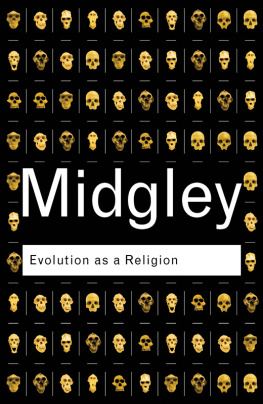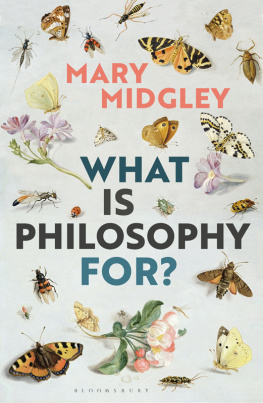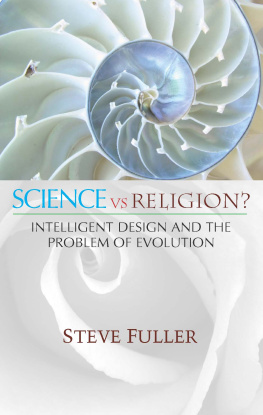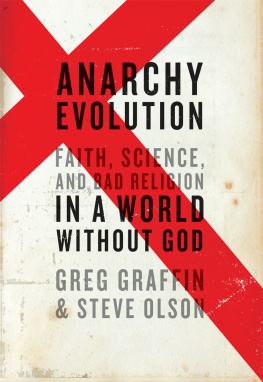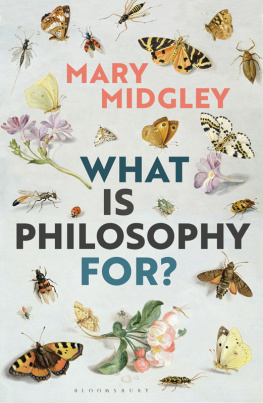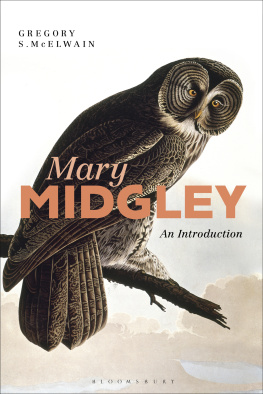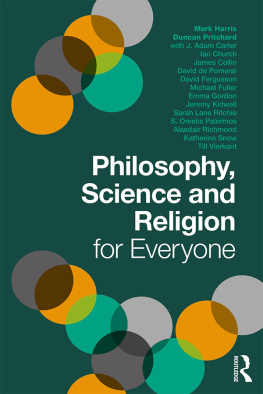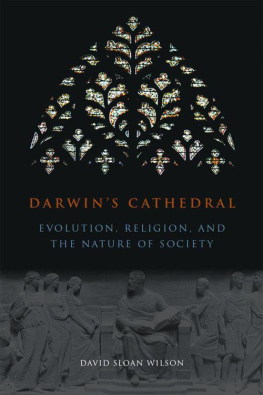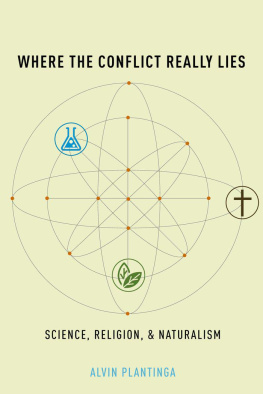Evolution as a Religion
Midgley is one of the most acute and penetrating voices in current moral philosophy. Her great gift is clarity, both of thought and, especially, of expression.... To follow her reasoning... is like watching a ballet dancer walking in the street: there is a litheness, a gracefulness, an ease of articulation, which attest to years of learning lightly worn.
John Banville
There is no doubt many will share her views, and will appreciate, as I do, the honesty of her declarations, and the unpretentious yet high moral tone of her prose.
The Times Literary Supplement
Such is her liveliness that she is never tedious, and the book held my attention to the end.... This is a book for anyone, lay or professional, with a lively mind.
British Book News
First published in 1985 by Methuen & Co. Ltd
Revised edition first published in Routledge Classics 2002
by Routledge
11 New Fetter Lane, London EC4P 4EE
29 West 35th Street, New York, NY 10001
Routledge is an imprint of the Taylor & Francis Group
This edition published in the Taylor & Francis e-library, 2003
1985, 2002 Mary Midgley; Introduction 2002, Mary Midgley
All rights reserved. No part of this book may be reprinted or reproduced or utilised in any form or by any electronic, mechanical, or other means, now known or hereafter invented, including photocopying and recording, or in any information storage or retrieval system, without permission in writing from the publishers.
British Library Cataloguing in Publication Data
A catalogue record for this book is available from the British Library
Library of Congress Cataloging in Publication Data
A catalog record for this book has been requested
ISBN 0-203-36168-7 Master e-book ISBN
ISBN 0-203-37426-6 (Adobe eReader Format)
ISBN 0415278333 (pbk)
ISBN 0415278325 (hbk)
Mary
Midgley
Evolution as a Religion
Strange hopes and stranger fears
Revised edition, with a new introduction by the author

To the Memory of Charles Darwin
Who Did Not Say These Things
ACKNOWLEDGEMENTS
This book has grown out of an article of the same name published by Basil Blackwell in 1985 in a book called Darwinism and Divinity, edited by John Durant. I am grateful to the publishers for permission to reprint its scattered elements here. The only other parts which have appeared before are as follows: in contain scattered parts of an article called De-dramatizing Darwinism, published in The Monist, 67, 2 (April 1984). I am grateful to all those concerned with these publications for their kind permission to reprint.
I have had a great deal of help from my family, friends and colleagues in this project which has proved unusually interdisciplinary and confusing. I would specially like to acknowledge the help of Ann Loades, Alec Panchen, Sylvia Feinmann, John Durant and David Midgley.
INTRODUCTION
This book had a very simple origin. In the early 1980s I was asked to speak at a conference on Evolution and Religion. This suddenly made me wonder whether the link between these two things was perhaps closer than had been noticed. Was the idea of evolution somehow beginning to be used, not so much as an antidote against religion but as a substitute for it indeed, as a form of religion itself?
I had been struck for some time by certain remarkable prophetic and metaphysical passages that appeared suddenly in scientific books about evolution, often in their last chapters. Though these passages were detached from the official reasoning of the books, they seemed still to be presented as science. But they made startling suggestions about vast themes such as immortality, human destiny and the meaning of life. These are difficult topics with which philosophical and religious thinkers have long wrestled. But the scientific writers did not usually refer to any earlier discussions. They simply and confidently laid down their own surprising views about them. Their pronouncements seemed to be seriously intended. But it was far from clear on what level they were meant to be taken.
All this seemed to me to raise most interesting questions about the kinds of thought that can go on in the wide areas that lie outside both official science and official religion. Simply defining these two to deal with similar and even more startling pronouncements made by physicists especially cosmologists and promoters of artificial intelligence.
Today, the approach to this phenomenon that I suggested in these two books still strikes me as reasonable. But has it got out of date? In sixteen years, the kind of quasi-scientific speculation that I wrote about might easily have been quite discredited and abandoned. In that case my books would, of course, no longer be needed.
I wish that this had happened. Instead, quite to the contrary, quasi-scientific speculation of the kind that I wrote about is, if anything, an even more rampant growth now than it was when I first drew attention to it. Moreover, it still comes in the same general forms.
Certainly the balance of emphasis between those forms has shifted somewhat. But I think it would not be sensible to rewrite the book now in order to track that shift. Academic life moves very slowly and strong rhetoric, once launched, can keep afloat for an amazingly long time. Several of the books that I have quoted have had huge sales. They are still regularly used as textbooks on countless courses. Their influence, direct and indirect, is bound to persist for a long time, even in those cases where, at a more refined level, they are supposed to have been refuted.
It will persist because the appeal of the myths that underlie them is strong so strong that, even if particular forms of those myths do become obsolete, new ones are always likely to replace them. And the point of my mapping project is not just to object to the particular forms. It is to make us more aware of the underlying myths themselves. That is the only way in which we can get some control over their influence. We still very much need to do this, even where a particular expression of them may be going out of fashion.
Among these recent shifts of emphasis the most obvious one is due to the end of the Cold War. Marxism, which I repeatedly cited as an example of a quasi-scientific faith approximating to a religion, has ceased to play that role in the West. It is, however, still vigorous as a faith in many parts of Africa and South America. And its effect on the history of Europe and indeed of China seems to me still persistent enough to make it important for us to understand it. So I do not think it would be sensible to remove it from my text. On the economic front, Marxist mythology has been succeeded by that of its near neighbour the belief in Market Forces, which also sometimes uses religious imagery, for instance in the notion of the Hidden Hand. That faith, however, does not usually appear in scientific books, so it is not relevant to my subject here.
By contrast, prophecies of a dazzling future for humanity, attainable through genetic engineering or artificial intelligence or both, have, if anything, grown louder and more frequent of late. So has the tendency to treat that project as if it were the inevitable next stage of evolution. But I do not think that they have become any more intellectually respectable, or produced any new arguments that I ought to answer.
What I said against such ideas in these two books still seems to me to be valid. I still think, as I did sixteen years ago, that these projects have nothing to do with any reputable theory of evolution. And for our real problems in the world, which are essentially social and moral, biochemical solutions (as proposed in genetic engineering) are usually irrelevant. Nor does it make sense to suggest that machines programmed by existing human beings will be able to reform our society for us when we cannot do it for ourselves. These schemes still seem to me to be just displacement activities proposed in order to avoid facing our real difficulties.
Next page
